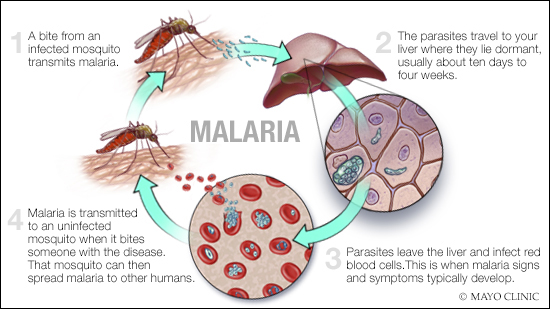-
Featured News
Mayo Clinic Q and A: Malaria continues to be a significant travel-related disease
 DEAR MAYO CLINIC: I’m planning a three-week trip to Tanzania. My doctor recommends that I take medication to prevent malaria. Is this really necessary? I thought malaria wasn’t common anymore. Are there other things that I can do to protect myself? Is effective treatment available for malaria?
DEAR MAYO CLINIC: I’m planning a three-week trip to Tanzania. My doctor recommends that I take medication to prevent malaria. Is this really necessary? I thought malaria wasn’t common anymore. Are there other things that I can do to protect myself? Is effective treatment available for malaria?
ANSWER: While there is no vaccine for malaria, it is essential that you receive medication to prevent malaria before you go to Tanzania. Although cases of malaria worldwide are decreasing, malaria continues to be a significant travel-related disease that carries a risk of serious illness and death. To discuss the specific malaria medication you need and other travel-related health precautions you should take, consult with a travel medicine expert well before your trip.
Malaria is a disease caused by a parasite that is transmitted to humans through the bites of infected mosquitoes. People who have malaria usually get a high fever, headache and shaking chills. Malaria symptoms typically begin within a few weeks after being bitten by an infected mosquito. Malaria can be fatal, particularly when caused by the variety of parasite called Plasmodium falciparum that’s common in tropical parts of Africa. The risk of death increases in people who have not been exposed to it previously.
Travel to certain parts of the world poses a higher risk of malaria due to the presence of the more potent type of malaria there, coupled with a higher density of mosquitoes within those areas. Its risk is highest for those traveling to countries in sub-Saharan Africa, followed by developing countries in Oceania. In the Western hemisphere, malaria risk is highest in Haiti and the Dominican Republic. There is also a risk in many countries of Southeast Asia, Central America and South America. The number of people returning to the U.S. with malaria has been increasing in past decades, and most cases have been Plasmodium falciparum.
The medications used to prevent malaria are very effective. It’s important that you get the correct type of medication for the area where you are traveling, though, and carefully follow the directions on how to take it. Different parts of the world have different species of malaria and require different medications for prevention. U.S. travelers who take preventive medication and still get malaria or die from the disease are those who take the wrong medication for their region of travel or take the medication incorrectly.
Those planning to travel to countries that have a risk of malaria should talk with their health care provider, make an appointment with their local travel clinic or visit the Centers for Disease Control and Prevention website to find the best preventive medication to take for their region of travel.
In addition to taking the right medication, follow other precautions to decrease your risk during your trip. That includes wearing long sleeves and pants while in these areas and applying insect repellent to exposed skin.
Insect repellents that are most effective contain DEET, icaridin or lemon eucalyptus extract. Apply repellent to your exposed skin in the morning after you’ve put on sunscreen. Reapply it in the early evening. If you don’t have netting for your bed, add a third layer of repellent before going to bed. For additional protection, use the insecticide permethrin on your clothing.
If you notice symptoms of illness after your trip, see a health care provider right away. Tell your provider of your recent travels. Effective treatment for malaria is available in the U.S. Because malaria is so uncommon in this country, however, providers may not be familiar with diagnosing or treating it, and malaria could be misdiagnosed as a viral illness. Treatment for malaria requires infectious disease expertise, and an infectious disease specialist should be consulted whenever malaria is suspected. Treatment for malaria involves IV or oral medications, depending on the severity of the illness. — Dr. Abinash Virk, Infectious Diseases, Mayo Clinic, Rochester, Minnesota
****************************
Related Articles
- Pretty Parasites With Dr. Pritt, part 5: Bad-news bugs published 11/2/18
- Mayo Clinic Minute: Tips for traveling to developing countries published 8/4/17
- Infectious Diseases A-Z: Traveling abroad? You may need to be vaccinated published 5/22/17







